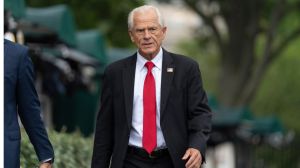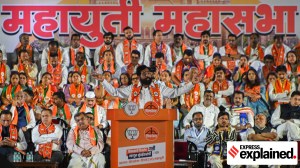Tsunami questions
At first, there was the same terrible sense of shock and concern across the world. What parent putting their child to bed in the last few da...

At first, there was the same terrible sense of shock and concern across the world. What parent putting their child to bed in the last few days, asked the columnist, has not thought of the toddlers snatched by the waves as they frolicked. Now, there are different tsunami questions, and various tsunami sideshows.
The sideshow, first. In America the media is busy decoding Bush8217;s nomination of Bill Clinton and his own dad to head a relief effort for tsunami victims. Bush must know, they say, that his response to the devastation in Asia had been viewed as too little, too late. Hence this unusual effort to project bi-partisan support, by someone who has determinedly fashioned himself as the 8216;8216;un-Clinton8217;8217;. Belated recognition of the moment8217;s symbolic potential, perhaps, to repair America8217;s image in the world.
In Britain, the sideshow has involved the jockeying between camp followers of the Prime Minister and the Chancellor, as both men seized the post-tsunami moment to outline their vision of international development, the centrepiece of which is touted to be Britain8217;s 8216;8216;Marshall Plan8217;8217; for Africa. Gordon Brown certainly had the defter phrase, as he called on the international community to harness the 8216;8216;passion of compassion8217;8217; generated by the Asian disaster to make 2005 a year of hope for the world8217;s poorest continent. Tony Blair could only prosaicly intone that Africa suffers 8216;8216;the equivalent of a man-made, preventable tsunami every week8217;8217;.
The tsunami also stirred up deeper questions. Any major earthquake, wrote Martin Kettle in the Guardian Weekly, contains a challenge to religion. What kind of a God would permit such a thing to occur? To this, Kettle added a challenge of his own: Europe once had the intellectual curiosity and independence to ask and answer such questions8212;but does 21st century Europe still have it? 8216;8216;Or are we too cowed now to even ask if the God can exist that can do such things?8217;8217;
Others ask whether the post-tsunami sheathing of hostilities in Sri Lanka and Aceh will hold. After all, as David Hale wrote in The New York Times, there is a precedent for an earthquake encouraging political reconciliation. In 1999, earthquakes struck Turkey and Greece just a month apart and facilitated cooperation between the two.
Could devastation such as this possibly be transformative, creative even? Or does this question speak only of our own unaesthetic groping for silver linings?
The second coming
Bush8217;s second term is to be formally inaugurated. But America8217;s liberal media is already provoked by him all over again.
It8217;s about Alberto Gonzales8217;s near certain confirmation as attorney general of the United States. Gonsalves, now the White House counsel, is widely regarded to be the central figure behind the policy decisions that laid the ground for the abuse at Abu Ghraib. 8216;8216;The nation deserves an attorney general who is not the public face for inhumane, illegal and clearly un-American policies,8217;8217; wrote the NYT, indignantly.
Columnists in the paper railed against an administration that 8216;8216;believes it can do and say whatever it wants8217;8217; and whose attitude is 8216;8216;changing the very nature of the United States8217;8217; by 8216;8216;eroding the checks and balances so crucial to American-style democracy8217;8217;. 8216;8216;We Are All Torturers Now8217;8217;, wrote one, in an angry take-off on the famous Le Monde headline the day after 9/11, which proclaimed 8216;8216;We Are All Americans Now8217;8217;.
But in Foreign Affairs, Professor of History at Yale, John Lewis Gaddis, offered a sympathetic assessment of Bush8217;s first term, in which the US administration conflated 8216;8216;prevention8217;8217; and 8216;8216;pre-emption8217;8217; to deal with the new world, post-9/11. That feature of Bush8217;s grand strategy, said Gaddis, is here to stay. He also mapped out what needs to change.
In the end, the historian advised nothing drastic. Just a language of government that speaks more 8216;8216;softly8217;8217;. And a vision that pays more attention to 8216;8216;detail8217;8217;. Things will not fall into place on their own. In his second term, said Gaddis, Bush faces a Bismarck-like challenge to carefully, patiently reconstruct a new world order that can sustain itself.
P.S. : INTERVENING in the tumultuous discussion on the impending elections in Iraq, in the Al Ahram Weekly, Omayma Abdel-Latif described the Iraqi interim government8217;s website.
The site has different sections touching on the constitution, law, security, business and economy. It also has a section entitled 8216;Electoral process8217;. Here, you might expect to find election-related education material, information about parties and candidates, voting guidelines. But the curious visitor finds only a blank page. Iraq8217;s political vacuum, wrote Abdel-Latif, is unlikely to be filled anytime soon.
8226; In Al Watan, Qenan Al-Ghamdi listened to the opaque phrases in the official Saudi media on a foreign dignitary8217;s visit to the Kingdom, and spelt out an urgent demand. An official Royal Palace spokesman must be appointed, he must step forward to tell Saudi citizens about foreign leaders8217; visits and other important things. Of course, such a spokesperson could evade and spin too, he admitted, but he must be there. Because 8216;8216;The point is8230;that he is there, giving information and outlining his government8217;s position and even on many occasions, answering questions from the press8230;8217;8217;
- 01
- 02
- 03
- 04
- 05































